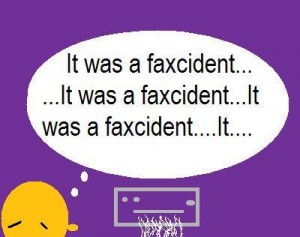Must Resume Faxing Be Taxing?
“My fax machine ate my resume”—good excuse

Internet faxing, iPhone app-faxing and their ilk have made faxing less taxing—in terms of time, energy and expense. Yet, some recruiters and job hunters reading this may through unfamiliarity, lack of alternative technology access or simple Luddite angst and stubbornness still be using conventional fax machines as their resume well and spout.
For many job hunters reading this who are forced to also be fax-machine hunters, fortunately for you, such machines are still plentiful in corner convenience stores. Unfortunately, they still need to be.
More broadly, many of you may feel compelled to send a fax because a signature is required, e.g., on an employment contract—perhaps unaware of an iPhone app called “Zosh” that for $3 allows you to sign-and-send with your finger.
Following Niger’s Lead
It can be even worse if you are reading this in one of the 34 of 108 countries surveyed in which there isn’t even one fax machine per 1000 people, e.g., Russia and Poland, 0.34 fax machines per 1000 and 0.97 per1000, respectively (compared with the champ, Japan, with 93.31 and distant runner-up, the U.S., with 55.28 per1000). [Data reported as “latest available” at http://www.nationmaster.com/graph/med_fax_mac-media-fax-machines#source.]
If you are a recruiter or employer looking for talent in Russia, Poland, or in any of the dozens of other countries with very few fax machines, beware: Don’t insist on a faxed resume!
On the other hand, it may be argued that the fewer the better—at least in the long run; so last-ranked (among the 108 countries surveyed) Niger’s 0.04 fax machines per 1000 people may not be so bad after all and, in fact, may be—at least statistically—leading the way to a fax-free future.
The Primitive Track-a-Stack Method
In those countries where there are too many, too old fax machines, a corporate techno-headache—like a persistent migraine that should have ended long ago—lingers. On the company and organizational demand side, requiring a conventionally faxed resume—one delivered to a bare-bones conventional fax machine—is going to create a logistical nightmare once all the collected resumes are printed and stacked. I’ve worked in offices where I’ve seen the stacks of hundreds in response to a single job opening.
Sure, somebody may be assigned to prioritize, alphabetize or simply keep track of them. But, given all of the physical and mental shuffling and tracking, there is an excellent chance that the candidate dimly recalled as being put at the top of the pile will have, like a shuffled ace in a deck of hundreds, ended up somewhere in the middle, requiring a one-by-one sequential search. I know—not a few times in the past few years, both in Hong Kong and here in North America, I was asked, “Have you seen the resume of that guy who….?”
Having It Both Ways: Random and Sequential Access
In contrast, an email-based collection of resumes will be compact, feature random access—through email search functions, as well as sequential access, e.g., by date or alphabetized sender, and take up zero space. Moreover, in virtue of not being in physical space, the resumes can, if apparently lost, most likely be retrieved and retrieved in one location, unlike possibly scattered paper resumes. They can be recovered through a search function, if the cyber-trash bin has not been emptied.
If you need to send a faxed resume, instead of receiving one, by email, there are online email-fax services that allow you to send a fax by email, e.g.,MyFax.com. On the other hand, those with a real “ITch” for the latest in information technology, email itself may seem far too primitive and cumbersome.
Keyword Filtering
Automatic software-based scanning of digital resumes for keywords, e.g., “team player”, “responsibility”, “project manager”, is nothing new. What is new are the more affordable forms it takes and the myriad features offered. But lots of companies don’t have any in-house.
The problem faced by anyone reviewing a conventionally printed resume is that the scan has to be done by eye—which after a few dozen resumes is going to become difficult as well as boring. As a test to prove my point about the superiority of an email scan, I just completed a simple experiment in my Yahoo email and typed in “team player”. Among my 27,000+ emails, 28 were nearly instantly retrieved. Among them, an email from a Chinese job-hunting friend, with an attached resume, in which “team player” was embedded.
Imagine trying to manually/visually screen 400 printed resumes, one at a time,that contain “G.M.A.T”, “M.A.T.” (Miller Analogies Test), “M.A.”, “M.D.”, “M.Ls.”, “M.Sc.”, “B.A.”, “K.G.B.” or “N.B.A.”, when you are looking for “M.B.A”? Of course, given the availability of resume screening software, such as “Resumator”, even email may seem outdated, inefficient, cumbersome—inasmuch as collecting, searching and reading are only three of many stages in resume processing. Tasks such as prioritizing and printing follow inexorably, even without high-tech add-on software capabilities. Nonetheless, if your company hasn’t invested in resume screening software, an email keyword cyber-search will still be better than the traditional manual-visual sequential review. Not cutting-edge, but definitely cutting time.
Higher-Tech Solutions
If your company decides to go higher-tech, for $29-$299 per month, Resumator (http://www.theresumator.com/home/tour/compare) says it can and email cannot do the following: Generate free traffic to your job listings, presort submitted resumes by job, make the text in resumes searchable, make reading and sharing resumes paper free, store all feedback with an applicant automatically, store all applicant information in one place, allow new files to be attached to an applicant, track the status of each applicant, track the source of each resume, finds subsets of resumes quickly, rank candidates so the best float to the top, recommend local and niche job board, provide a branded careers website and ensure required information is always submitted.
Nice…..
…Although you’ve got to wonder whether, like HAL, the super-computer in Stanley Kubrick’s classic sci-fi flick 2001, Resumator can ask, “Will I dream?”

